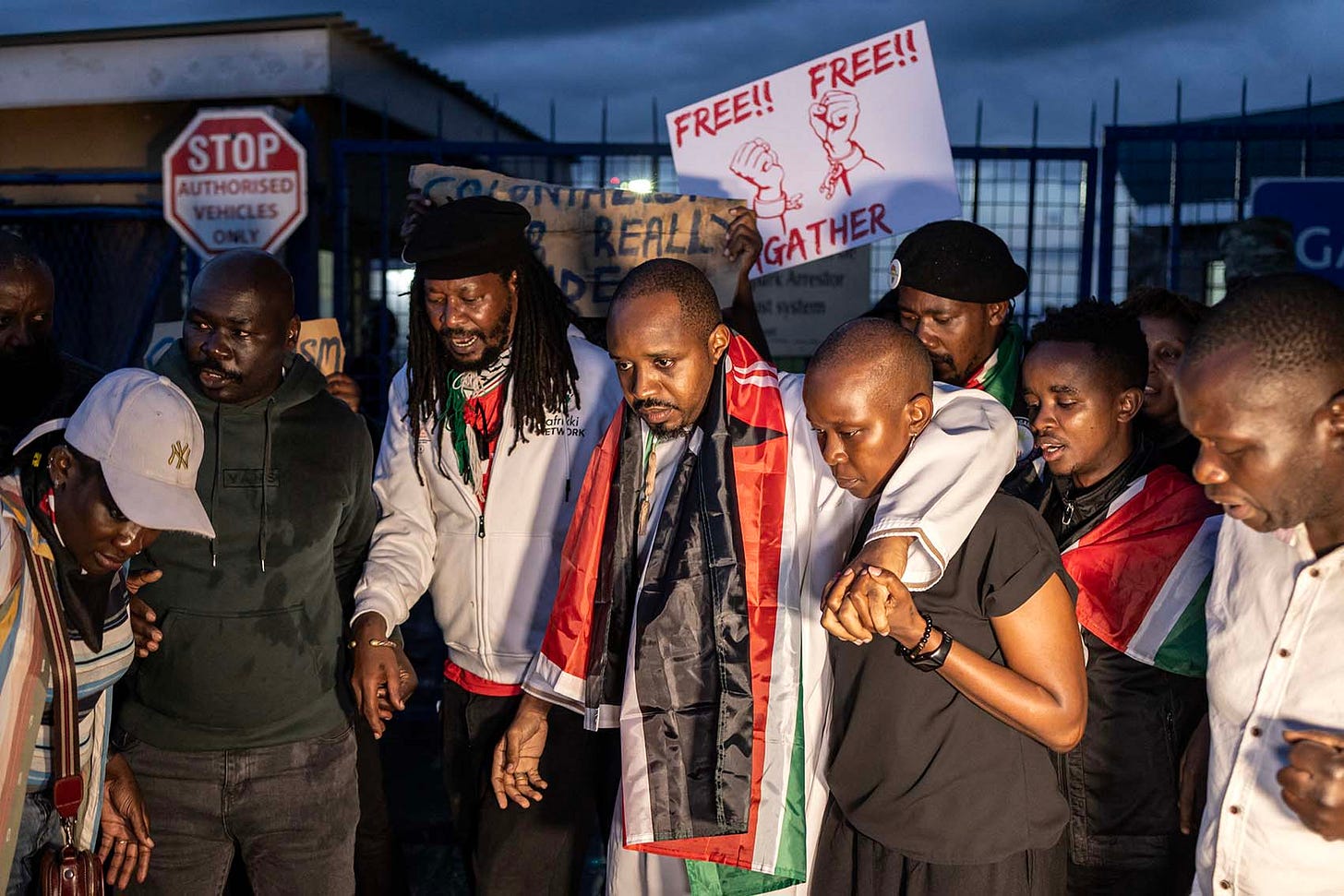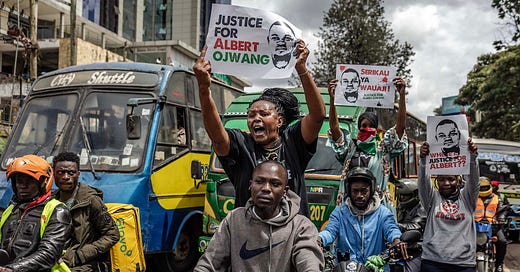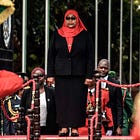State security is terrorising citizens at record levels across East Africa
More people are being disappeared, abused and killed for standing up for their communities. And countries are working across borders to ensure nobody is safe.
Robert Amalemba in Nairobi
Over the weekend, Kenyans learned that a 31-year-old teacher and blogger, Albert Ojwang, had died in police custody. He was arrested in Homa Bay, a town on the Kenyan shores of Lake Victoria, transferred 400km to Nairobi’s Central Police Station – and then died.
Police initially said he died by suicide, allegedly by smashing his head against a cell wall – an implausible account that sparked national outrage. An autopsy says he suffered head injury, blunt force trauma, neck compression and multiple bruises. His family and human rights groups are calling his death a police execution.
Ojwang’s death comes amid escalating state violence against people in Kenya and East Africa in general. Across all eight countries that make up the East African Community bloc, that kind of violence is nearly the worst it’s been in a decade, and has been escalating for longer, going by the reported incidents in the Armed Conflict Location and Events Database (Acled).
More violence in Ruto’s Kenya
The escalation has been particularly remarkable in Kenya. The bloc’s most prosperous country had been considered “sort of safe” as governments in Burundi, Somalia and Uganda ramped up violence against civilians, driving regional trends.
But reported incidents in Kenya have more than doubled during the 33 months of William Ruto’s presidency, compared to the 33 months right before, from 122 to 271. Abductions have quadrupled, from 22 to 100. And all the recorded abductions – before and after Ruto became president – were attributed to the Kenya police force, not any other security agency.
Some sources paint an even worse picture.
A coalition of human rights organisations in Kenya have linked the police to 104 extrajudicial killings and 55 enforced disappearances in the state’s brutal crackdown on last year’s anti-tax, youth-led protests.
This year so far, Kenya has recorded more incidents of state violence against civilians than Burundi, the region’s perennial worst offender, according to Acled data.
“We are aware that some police officers brutalise citizens,” said Kipchumba Murkomen on Friday. He is Kenya’s cabinet secretary for interior and national administration under whom the police fall. “But with a force of 120,000, the actions of a few cannot be used to generalise the entire police service. We will ensure that individual rogue officers are brought to justice while protecting those who are doing a good job.”
On Wednesday, President Ruto tweeted: “Police must protect Kenyans and their property from criminals, including those in uniform.”
Protest movements are calling for the resignation of the deputy police chief Eliud Lagat who reportedly ordered Ojwang’s arrest.
Last year, following similar calls after the anti-tax protests, Ruto replaced the force’s then- head, Japhet Koome. But no other police officers have been punished since.
Regional co-operation
Another trend has started to emerge: cross-border state repression. Politically vocal East Africans have been tracked, kidnapped, detained, and brutalised away from home, while visiting or living in other countries in the bloc. This has been met with mutual silence from governments in the region.
Earlier in the week of Ojwang’s death, two activists – Kenyan Boniface Mwangi and Ugandan Agather Atuhaire – held a press conference to shed light on a saga that gripped the region for weeks.
The two were arrested at a hotel in Dar es Salaam during a visit to observe the treason trial of Tanzanian opposition leader Tundu Lissu. For four days, their whereabouts were unknown. At the Nairobi press conference, the activists described suffering horrendous torture, including sexual violence, during their detention and interrogation in Tanzania.
While Tanzania held them incommunicado, Kenya’s foreign affairs minister, Musalia Mudavadi, appeared on Citizen TV, the country’s most-watched station, and seemed to rationalise rather than condemn the action: “We have to be realistic. In Kenya, we tolerate some things that cannot be tolerated elsewhere.”
“My government let me down,” Mwangi said after the ordeal. “My government sided with [President Samia] Suluhu’s government and said we were interfering with Tanzanian politics.”
For days, Uganda’s government remained silent about the disappearance of Atuhaire, who is currently one of its most high profile critics. “For our government, it was: ‘Good riddance. Someone else is getting rid of our headache’. Why would they care about that?” Atuhaire said.

After public backlash, Kenya formally protested to Tanzania. Uganda followed its example a day later. Mwangi and Atuhaire turned up shaken, hundreds of kilometres from Dar es Salaam – at the Lunga Lunga and Mutukula border posts respectively – hours after each formal diplomatic note.
Within Tanzania, Suluhu suffered little grief over the events. She justified them by saying that the activists intended to export “bad manners” and interfere with her country’s politics.
In Parliament, Maryam Omar Said, a legislator from Zanzibar, suggested that Tanzania authorities should have done worse. She said that prominent Kenyan lawyer Martha Karua, who was deported shortly after arrival for the Lissu trial observation visit, should have “returned on a gas bed”– a hospital stretcher.
Outside Parliament, politicians from the ruling party, Chama Cha Mapinduzi (CCM), took the anti-Karua vitriol further. Marwa Daudi Ngicho, a district party chair, said he would have sexually abused Karua if given the chance: “I would have made her pregnant. Kenyans have failed to impregnate her.”
Jesca Msambatavangu, a woman MP, denigrated Karua’s looks: “Her face without a hint of makeup – suggested mental instability. Our police were right to restrain her at the airport.” Local media reported several other prominent CCM figures tearing into Karua.
Asked about the allegations made by Mwangi and Atuhaire, Dar es Salaam police commander Jumanne Muliro told Citizen TV that the torture did not happen – since the two activists did not file a police complaint about it.
“We now understand that as citizens we are on our own,” said Atuhaire. “We only have each other. We have no governments, no police constitutionally mandated to protect citizens.”
An escalating pattern
The Mwangi/Atuhaire debacle was the latest episode in a pattern that has made regional news since July 2024 when Kenya deported 36 Ugandans and handed them over to Ugandan authorities, who charged them with terrorism. The young people are members of Uganda’s Forum for Democratic Change (FDC) political party which said they went to Kenya for a training retreat on leadership and communication skills.
Months later, in November 2024, FDC founder Kizza Besigye was kidnapped in Nairobi. His spouse, UNAIDS secretarygeneral Winnie Byanyima, said he was visiting the city to attend Karua’s book launch. Besigye was clandestinely taken to Kampala where he was arraigned days later and charged with treason together with his aide, Obeid Lutale. Initially court martialled even though they are civilians, Besigye, like Lissu in Tanzania, remains in prison.
This January, Tanzanian journalist and activist Maria Sarungi Tsehai was also kidnapped in Nairobi. Handcuffed, she was driven around for hours and interrogated by individuals she suspected to be intelligence officers of the Tanzanian government.
“What we’re witnessing in East Africa is the rise of dictatorship, the weaponisation of the police, and a steady erosion of democracy,” Eugene Wamalwa, Kenya’s former justice minister and now a lawyer who heads a political party, told The Continent.
Wamalwa added: “Regimes are increasingly using state institutions to silence dissent, trampling on the East African Community Treaty, the EAC Protocol on Peace and Security, and the African Charter on Human and Peoples’ Rights.











Backward we have become.....